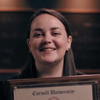Leaders need to be able to collaborate, innovate, problem solve, and build relationships. All of these core responsibilities require excellent communication skills. Often when thinking of leaders, we picture them addressing crowds, giving directives, and commanding forces. Leaders need to be able to do those things, but they also need to be top-notch listeners and have the ability to use a variety of communication tactics at the right times.
In this course, Professor Erica Dawson, Ph.D., the Nancy and Bob Selander Director of Engineering Leadership Programs at Cornell University, will break down critical skills that facilitate collaborative communication. She will guide you as you practice and apply these techniques.
Many of the skills in this course, including listening and asking powerful questions, are core to strong interpersonal communication. These skills help you establish, improve, and maintain relationships. You will focus on workplace examples, but these skills are applicable outside of the workplace as well. Many of the skills are hard to learn and even harder to make a habit. Your life outside of work will impact your work and your ability to have good relationships. Mastering these communication skills and learning to leverage them to create open and collaborative communication is key to the future of any leader.







